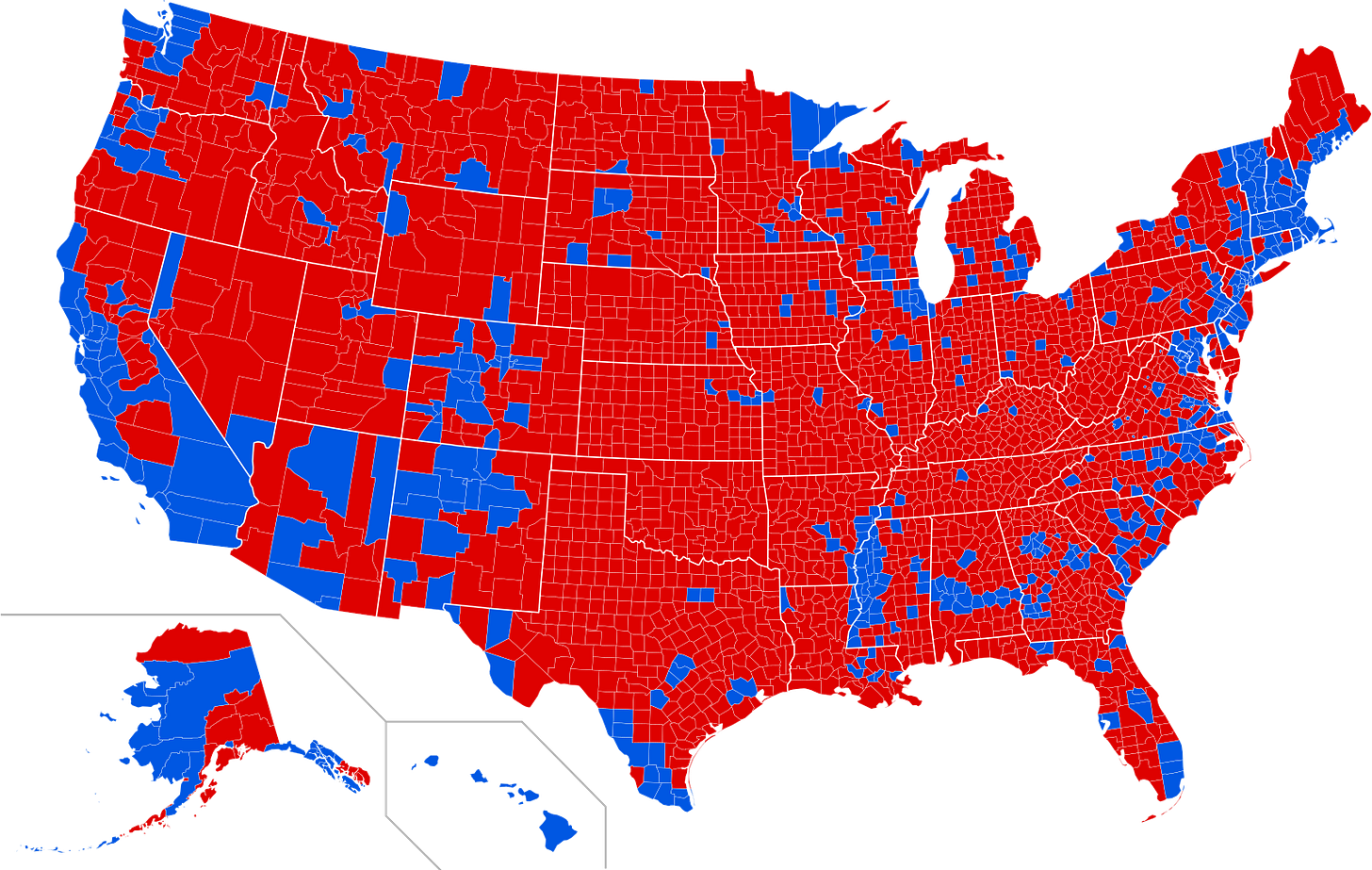Why Every Small Rural Town in America Is Marienthal
Red states won't stay red if jobs are guaranteed for all

It’s election night. You’re watching the latest results, marveling at little blue spots in a sea of red wondering, “How do Democrats ever win any elections with maps that look like this?”
We all understand that those blue spots represent urban enclaves of righteousness and that the sea of red represents large swaths of rural indignation, but still. That’s a whole shit ton of indignation, to borrow a phrase from the beloved red state family drama, “Ozark.”
It’s maddening to know that Democrats have to absolutely kill it in the suburbs in order to win elections. I don’t know about you, but I’m tired of seeing the fate of the world hinge on the whims of a few soccer moms in urban collar counties in a few states.
I’m sorry. I should not profile soccer moms. Many of them are very kind, decent people. Maybe all of them. I mean, they’re soccer moms. How bad can they be? I still don’t want the fate of the nation dependent on them.
Can Marienthal save us from soccer moms?
Why is it that when Europe killed non-Europeans for sport, Americans were all over that, but when Europe does cool things like implement national health insurance and treat drug addiction like a health issue instead of an excuse for mass incarceration, Americans look away?
Well, look away if you want to, but I’m going to talk about a small Austrian village called Marienthal, and how it relates to that endless sea of red you see at the top of this page.
You see, Marienthal beta-tested a guaranteed jobs program, and guess what happened? Everybody felt a lot better about life and things in general.
Researchers descended upon the town, and they found that the overwhelming majority of people who tried the jobs program smiled and said, “Yay! We like this! And I like me again, too!”

Before we explore that, I want to briefly encapsulate the problem posed by rural America. Forget the zaniness and attraction to MAGA you have been reading about during the last eight years. It’s all just a symptom of a larger problem, just like gun violence is a symptom of a larger problem in urban areas and among bored incels.
I’ll borrow a few paragraphs from a New Yorker story to point out something that sounds eerily familiar.1 The story describes conditions in Marienthal in the early 1930s.2 Times were tough:
Austria’s banking system had collapsed. The town’s main employer, a textile factory, had closed, laying off hundreds of workers.
That second line is right out of the storyline about America’s plight, too. Right? We’ve read about this kind of thing hundreds of times. Whether it’s one or two factories in a small town, or steelworks on the south side of Chicago, when a major employer blows out of town, the social structure…
…Hmm, what happens, exactly? Let’s read on about Marienthal, shall we?
After applying for a hundred and thirty jobs with no success, another man spent half his days in bed. Political meetings shrank, fewer books were checked out from the library, and domestic quarrels and alcoholism shadowed marriages. Even children felt hopeless: “I want to be a pilot, a submarine captain, an Indian chief, and a mechanic,” one twelve-year-old boy wrote in a school essay. “But I am afraid it will be very difficult to find a job.”
This was the early 1930s. In Austria. Yet it bears a stark familiarity, doesn’t it? Wait. An Austrian boy wanted to be an Indian chief? Is it just me or is that a little odd for a 1930s kid from a small village in Austria?
Anyhoo, three University of Vienna researchers published a small book titled Die Arbeitslosen von Marienthal (The Unemployed of Marienthal). It became a semi-famous sociological study in academic circles confirming what we all know: unemployment sucks. I think they should have studied the kid, too, but whatever. Maybe they were a little afraid of him.
As The New Yorker so aptly describes it in its article:
Work is a source of structure, esteem, and motivation, and its disappearance can lead to depression, anxiety, addiction, and interpersonal turmoil. (It’s estimated that as many as one in five suicides can be linked to joblessness.)
In America, the same mess led to Donald Trump. If only the researchers had known.
Well, actually, they did:
As Hitler’s power grew, the yearnings for activity, structure, and community articulated by the unemployed in the Marienthal study came to seem newly ominous. “On a large scale it is quite probable that part of the success of the early Hitler movement came about because large numbers of unemployed were taken into barracks and kept busy with paramilitary training,” one of the sociologists wrote, in a foreword to the American edition.
“Wait!” You say. “Unemployment numbers in America are pretty darn good, aren’t they?” If you can steam up the back window of a car you can get a job, right? Is this really a big problem?
Well, unemployment in rural areas is pretty high. You can do your own research, but I’ve seen anywhere from 8% to 13.5%. The further into the boondocks you get, the fewer Amazon delivery and warehouse jobs there are. Besides, those kinds of jobs aren’t exactly fulfilling, even if they are technically fulfillment jobs.
And here’s another thing. Rural folks are often unemployed because their family lost a farm or ranch, or someone has lost a good job in a factory that has supported their town for years. They’ve lost their way of life. You’d be cranky, too.
The deep problems of underemployment hit urban areas first. The difference is that urban folks didn’t lodge protest votes for lunacy the way rural folks have. It’s a sad truth that the suffering of rural folks is making the rest of us suffer in ways urban suffering did not, but maybe there’s a way out.
As I see it, the way out is Marienthal.
Jobs for all! No, I mean, for real!
We hear a lot these days about guaranteed income. It sounds nice, right? Everybody gets a few bucks every month.
But I have concerns. Not for Republican reasons: I would never buy their rationale about the possibility of disincentivizing people.
My issue is that a guaranteed basic income strengthens the hands of power brokers. It retains the split of extreme wealth and those who have to choose between an ice cream cone for the kids or diapers. Guaranteed income increases dependency on the system that causes unemployment or forces people into jobs they don’t want.
Guaranteed income will not stop the international conglomerate that owns your apartment building from raising the rent by 25%. In fact, it may encourage them to do so.
None of the proposed guaranteed income plans offer anything more than a pittance. It’s like those letters you sometimes get in the mail from big law firms who proudly announce they’ve won a big class action lawsuit, and when you find out how much you scored, you find out it’s a couple of dollars.

Guaranteed income tosses a few dollars your way but it keeps you tied to the broken system of inequality.3
Marienthal tried something different:4 A jobs program that guaranteed a job for anyone who was jobless for at least a year.
The Marienthal beta test included a group of researchers to check out how people’s psychological profiles fared during the test. The jobs came from a variety of sources involving the private and public sectors, including non-profits.
Some jobs were subsidized by the government, some weren’t. Researchers were keen to discover if the conditions that triggered despair in Marienthal in the 1930s would be reversed by a guaranteed jobs program. According to the article, they were. People felt, well, happy.
It’s a small program. Only about one hundred people participated in it. That’s obviously not enough to jump up and down and yell, “Fire up a new government program!” And, of course, Austria isn't the United States.
But there are some interesting pieces to it, and if you’re at all like me, you’re tired of the continuing stream of non-solutions coming from politicians in America.
According to Lukas Lehner and and Maximillian Kasy5
This program provides a guaranteed job to all residents of this municipality who were long-term unemployed (12 months or more) or at risk of long-term unemployment (9 to 12 months). Participation in the program is voluntary, but no person who was offered a job has declined the opportunity. A small number of eligible individuals could not be offered employment for reasons including illness, a prison sentence, or because they found regular employment before the start of the program.
The guaranteed job was preceded by individually tailored preparatory training of about 8 weeks. The jobs themselves could either be subsidized jobs in the regular labor market, or (for the majority of participants) employment in a social enterprise, implementing projects for the municipality. Salaries for all participants were at least equal to the minimum wage set by collective bargaining.
The program, funded by the Public Employment Service (Arbeitsmarktservice, AMS) of Lower Austria, employed 13 carpenters and an animal therapist. It employed seven tailors, six gardeners, five renovation workers, three registrars, three cleaners, one driver, and an assistant counselor. It also employed several office clerks, two warehouse workers, and two assistant electricians. The program also filled jobs for forklift drivers and other similar roles.
It even hired a marketing assistant and HR consultant.
Unemployment dropped to less than one percent. People were happier, according to the researchers who studied the program as it was implemented.
We all know people who like to tinker. Maybe they create and sell stuff on Etsy. Maybe they are carpenters or woodworkers. Maybe they’re gardeners. They may like to remodel cars or homes. They may like pottery or enjoy painting houses. All of these people could be put to work rejuvenating small towns and urban areas.
Many of them won’t need the program because they’ve found entrepreneurial success. But others will always need a little extra help.
Other people like to work with fabrics. Put them to work, too. You can even put writers to work by having them work on brochures for park districts, as well as state and national parks. You can put photographers to work the same way.
This stuff isn’t new. The WPA (Works Progress Administration) did this as part of the New Deal. The WPA built things ranging from small movie theaters to The Tennessee Valley Authority’s dams.
The unemployment problems in urban and rural areas are the same. So is the solution.
It doesn’t all have to be subsidized by the government, but some would be. The key would be finding a way to legislate companies into participating since it’s unlikely that many corporations would be cooperative with something the lunatic right will surely call “socialism.”
How to pay for it?
That’s pretty easy.
Who do you know really needs $32 million when $31 million will do?
The solutions to core problems in America require some radical thinking. The U.S. should have introduced a substantial wealth tax decades ago. Funding question answered. Nobody needs $32 million. Or $22 million for that matter.
We need to end extravagant wealth if we’re going to address the coming problems of machines taking over our jobs. One way to do this is to build job guarantees into national legislation.
What if every small town in America had a warehouse full of 3D printers that folks could be trained on and use for free? What if these warehouses dotted the Bronx or the south side of Chicago?
We wouldn’t be talking about the oppression of technology. We’d be talking about a renaissance.
I don’t know about you, but I’m tired of seeing the sea of red every election night, even if that red sea indicates vast swaths of sparsely populated areas.
Americans need to start thinking out of the box if they want to solve the problems they’re facing. It’s a country full of imagination and creativity. Let’s harness it while we can. The alternative is already taking shape: a nation of mindless drones banging their fists against the table asking, “Where did it all go so wrong?”6
Notes
A version of this was published on Medium’s Politically Speaking by yours truly in March 2023.
It’s worth noting another thing that can help invigorate rural communities and smaller cities: immigration. Springfield, Ohio says hi. More on that in a future post.
Jahoda, M., Lazarsfeld, P. F., and Zeisel, H. (2017). Marienthal: The Sociography of an Unemployed Community (Original Work Published 1933). Routledge.
If you can find a way to make basic income go beyond a pittance, however, then my mind probably changes.
Lehner, Lukas & Kasy, Maximilian, 2022. "Employing the unemployed of Marienthal: Evaluation of a guaranteed job program," INET Oxford Working Papers 2022-29, Institute for New Economic Thinking at the Oxford Martin School, University of Oxford.
Ibid
As many commenters have noted in my related stories on Ruminato, it all started to go wrong when Reagan was elected.


"As many commenters have noted in my related stories on Ruminato, it all started to go wrong when Reagan was elected." But Reagan rode a wave that started much earlier. One interesting book on the topic is Upswing by Putnam https://en.wikipedia.org/wiki/Robert_D._Putnam . He goes back to 1870 and tries to understand the long waves of change in American politics.
When it comes to taxing wealth: There is the old idea of a land value tax. One could increase the size of the tax more than linear with the size of the land. This way owning for renting would be less profitable and owning ones own appartment would become more affordable.